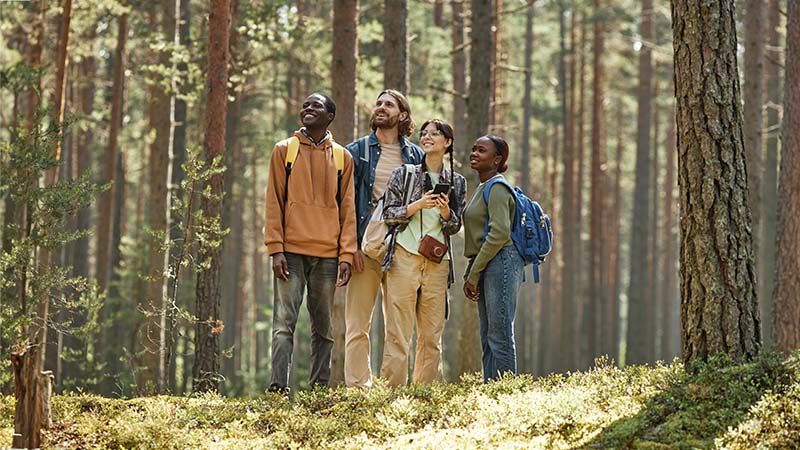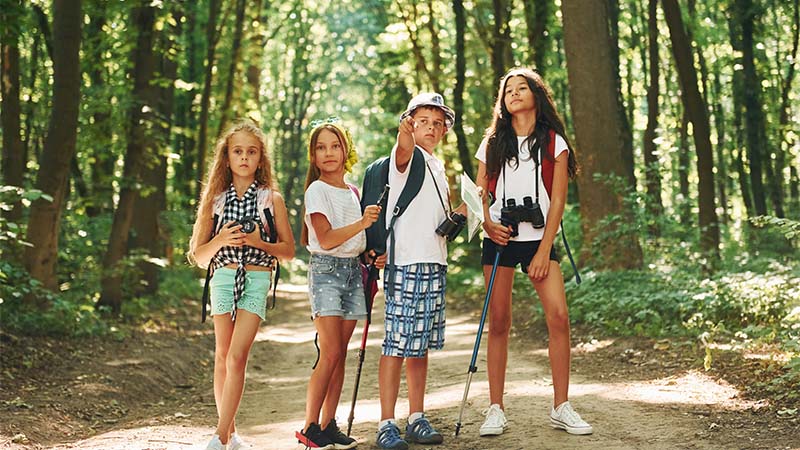In the face of growing environmental concerns, the role of summer camps in fostering sustainable practices has become increasingly important. Summer camps, which traditionally immerse children in natural settings, are uniquely positioned to lead by example in environmental stewardship. Implementing sustainable practices not only minimizes the ecological footprint of the camps but also provides valuable learning experiences for campers.
This focus on sustainability involves a holistic approach, encompassing everything from energy use and waste management to conservation activities and environmental education. By integrating these practices, summer camps can significantly contribute to environmental conservation efforts and instill a sense of responsibility in the next generation. The introduction of sustainable practices in these settings is not just a necessity but an opportunity to shape environmentally conscious attitudes and behaviors in young campers.
The Importance of Sustainability in Camp Settings
Sustainability in summer camps is more than an environmental initiative; it’s an essential part of their ethos and educational mission. Here’s a deeper look into its significance:
- Direct Environmental Impact: Camps, nestled in natural environments, directly influence their surroundings. Sustainable practices help mitigate negative impacts like waste generation, water pollution, and energy consumption. Implementing eco-friendly strategies such as recycling programs, water conservation measures, and using renewable energy sources can significantly reduce a camp’s ecological footprint.
- Educational Opportunity for Campers: Summer camps are ideal platforms for environmental education. They offer unique opportunities for hands-on learning about sustainability, like participating in recycling projects, learning about local ecosystems, or practicing energy conservation. These experiences teach campers the importance of environmental stewardship in a tangible and memorable way.
- Instilling Sustainable Habits: By incorporating sustainability into their programs, camps play a crucial role in shaping the environmental consciousness of young minds. They help instill sustainable habits and values that campers can carry into their adult lives, contributing to a more environmentally responsible society.
- Long-Term Benefits for the Environment: Sustainable practices in summer camps contribute to broader environmental goals, such as reducing carbon emissions and preserving biodiversity. By adopting these practices, camps not only enhance the immediate environment but also contribute to global conservation efforts.

Understanding and embracing the importance of sustainability allows summer camps to become leaders in environmental stewardship, setting an example for campers and the wider community. This commitment to sustainability ensures that the beautiful natural settings of these camps are preserved and cherished for generations to come.
Eco-Friendly Initiatives for Camps (Expanded)
To effectively embrace sustainability, summer camps can implement a range of eco-friendly initiatives that touch on every aspect of their operations:
- Comprehensive Waste Management: Developing a robust waste management strategy is crucial. This involves not just recycling but also reducing waste at its source. For example, camps can opt for bulk dispensers for toiletries to minimize packaging waste, provide reusable water bottles and utensils, and organize waste segregation workshops for campers.
- Energy Efficiency and Renewable Resources: Moving towards renewable energy sources like solar panels is a significant step. Additionally, camps can implement energy-efficient practices, such as using energy-efficient appliances, encouraging natural lighting during the day, and educating campers about the importance of conserving electricity.
- Water Conservation Measures: Implementing water-saving practices is essential. This can include installing low-flow showerheads and toilets, fixing leaks promptly, and using drought-resistant plants in landscaping. Educating campers about the importance of conserving water through activities like timed showers can also promote mindfulness about water usage.
- Sustainable Food Practices: Emphasizing sustainable food choices can have a substantial environmental impact. This includes sourcing food locally to reduce transportation emissions, offering plant-based meal options to lower the carbon footprint, and teaching campers about sustainable agriculture through activities like gardening.
- Environmental Education Programs: Integrating environmental education into the camp curriculum helps campers understand the importance of sustainability. Activities like nature walks, wildlife conservation projects, and interactive workshops about ecosystems can foster a deeper appreciation for the environment.
- Eco-Friendly Transportation: Encouraging the use of eco-friendly transportation, like organizing carpools for campers or using bicycles within the camp, can significantly reduce carbon emissions.
By adopting these detailed and comprehensive eco-friendly initiatives, summer camps not only reduce their environmental impact but also play a pivotal role in educating and inspiring the next generation of environmental stewards.
Educating Campers on Environmental Stewardship
Educating campers on environmental stewardship is a critical component of sustainable camping. Here are expanded ways to integrate this education:
- Interactive Environmental Workshops: Organize workshops that cover topics like renewable energy, biodiversity, and sustainable living. These can be interactive sessions where campers participate in experiments or projects that illustrate environmental principles.
- Nature-Based Activities: Incorporate activities that directly involve campers with nature. This could include guided nature walks focusing on local flora and fauna, bird watching sessions, or even night sky observations to discuss the broader ecosystem.
- Eco-Challenges: Set up challenges or games that promote sustainable practices. Examples include zero-waste challenges, water conservation activities, or energy-saving competitions.
- Role-Playing and Simulations: Use role-playing games or simulations to teach the impact of human activities on the environment. This can help campers understand complex concepts like climate change or ecosystem disruption in an engaging way.
- Guest Speakers: Invite environmentalists, scientists, or local conservationists to speak to campers. These real-world perspectives can greatly enhance the learning experience and inspire campers.

By integrating these expanded educational strategies, summer camps can effectively instill a sense of environmental responsibility in campers, ensuring that the principles of sustainability are understood and valued.
Success Stories: Camps Leading the Way in Sustainability
Highlighting success stories of camps that have embraced sustainability can inspire and guide others. Here’s an expanded view on this aspect:
- Case Studies: Share detailed case studies of camps that have successfully implemented sustainability practices. This could include their journey towards renewable energy usage, waste reduction achievements, or successful integration of environmental education into their curriculum.
- Impact Metrics: Discuss the tangible impacts these camps have achieved, such as reduced carbon footprints, increased biodiversity in their areas, or significant waste diversion from landfills.
- Community Involvement: Highlight how these camps have involved the local community in their sustainability efforts. This could include partnering with local environmental organizations, community-driven conservation projects, or educational outreach programs.
- Innovative Practices: Showcase unique or innovative sustainability practices that have been successful. Examples might include the use of cutting-edge technology for conservation, creative recycling projects, or unique water conservation methods.
- Lessons Learned: Share the challenges these camps faced and how they overcame them. This can provide valuable lessons for other camps looking to implement similar practices.
By focusing on these success stories, other camps can gain inspiration and practical ideas for implementing their sustainability initiatives, proving that a greener approach is both feasible and beneficial.
The integration of sustainable practices in summer camps is not just a trend but a necessity for fostering a healthier planet and more environmentally conscious future generations. These camps, with their success stories and educational initiatives, serve as beacons of hope and models for environmental stewardship. They demonstrate the feasibility and benefits of sustainability in action, inspiring campers and the broader community alike. As more camps adopt these practices, they collectively contribute to a larger movement towards a sustainable future, ensuring that the joy and learning experiences of summer camps are preserved for years to come.
